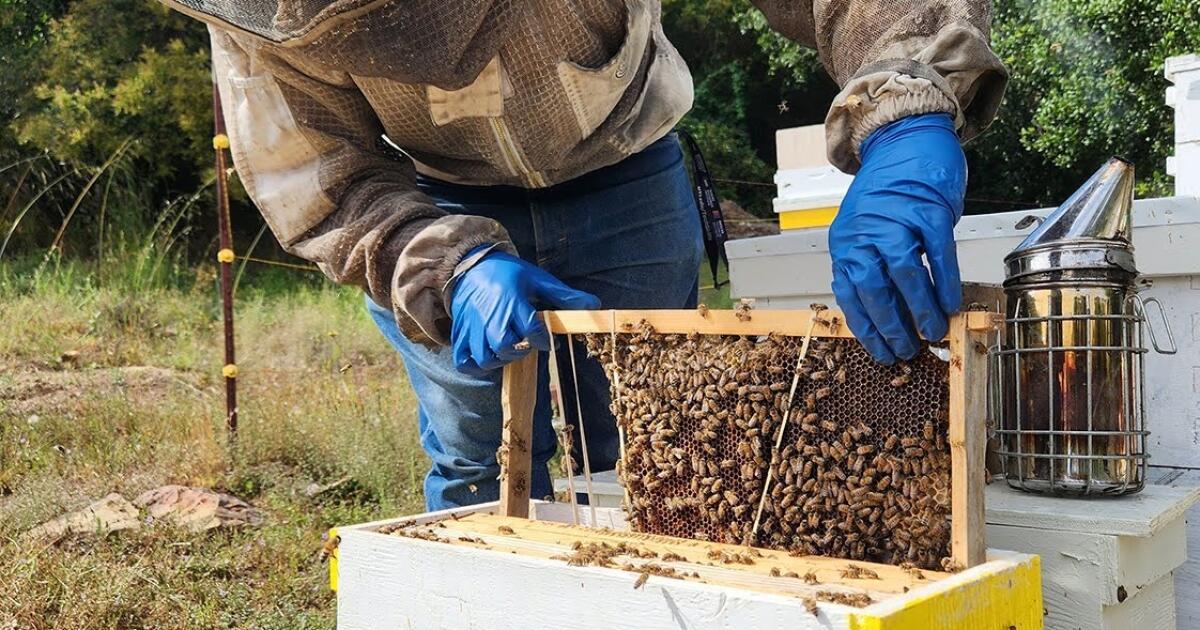
On the morning the Mountain fire erupted, wind gusts were so strong in Somis that several of the sturdy wooden boxes that housed Eduardo Flores’s bee colonies had already blown over. Flores was watching the feed of his security cameras from home and preparing to drive over in his truck when he received a message from his brother-in-law: There was a fire close to the bee yard. Within an hour, all 150 boxes had been destroyed in the blaze and millions of bees were dead.
“All we could do was watch,” said Flores, who owns Ventura Bee Rescue, a company that removes troublesome bees from people’s homes, rehabilitates the colonies, and then relocates the pollinators to help sustain local bee populations. Each box in the Somis bee yard held a single hive with 40,000 to 80,000 bees, including one queen — nearly half of his entire business. “The loss was very sudden, it happened really fast, especially because we’re really close to where the fire started,” Flores said.

He still wonders whether there was anything he could have done to save the insects. “When I try to describe it to people, I say we tried, but there was just no way.” The devastating Mountain fire, which is currently about 82% contained, has destroyed more than 240 structures across its 20,630-acre footprint; an additional 125 structures have been damaged.
Flores’ western honey bees, Apis mellifera , had been staying on the farm in Somis for the winter, feeding on the nearby pepper trees and eucalyptus to help get them through to spring. The 150 hives that burned represented more than half of the company’s colonies — each of them worth $400 to $500 in equipment alone. In total, Flores estimates that the fire cost him more than $35,000.
“It sets us back, because it reflects a couple years’ worth of work.” Flores is a former software engineer who once worked with bees as a hobby. He and his wife — a biochemist — developed a passion for bees and decided to start the business, bringing the rescued hives to small farms in the area to help pollinate their crops, and selling raw honey locally.
“The more you learn about bees, the more you appreciate them,” he said. Bees serve a crucial role in pollinating native plants and crops, but their populations have been declining worldwide. Since 2007, some bee populations have fallen by more than 80%, according to research from the U.
S. Forest Service , part of the U.S.
Department of Agriculture. Flores quickly became a bee advocate, touring local schools, libraries and museums to educate children about the importance of bees and sharing his love for the often-feared creatures. Each spring, he brought plain white boxes to an event called Pollinator Palooza in Ventura, where children painted them in bright colors.
Flores said he plans to rebuild his lost boxes and restore the colonies quickly. “They’re not going to stop and we can’t stop, either.” Flores has set up a GoFundMe account , where he has already raised more than $5,000 to buy new equipment.
But he said the unique character of the Somis bee yard will be much harder to replace. “You could see the colorfulness out there. That’s something that will be missed,” he said, recalling the boxes covered in rainbow-colored children’s drawings and messages.
“That is what really hurt, to just watch that all go up in flames. Until the camera gave out.”.














